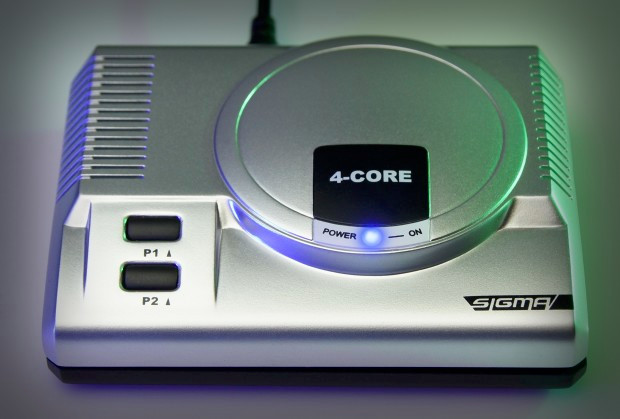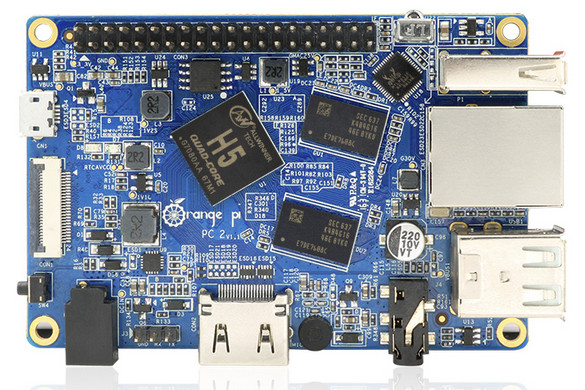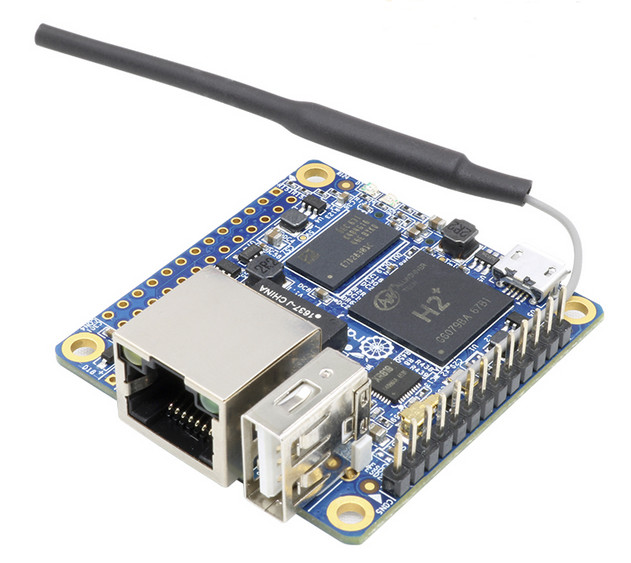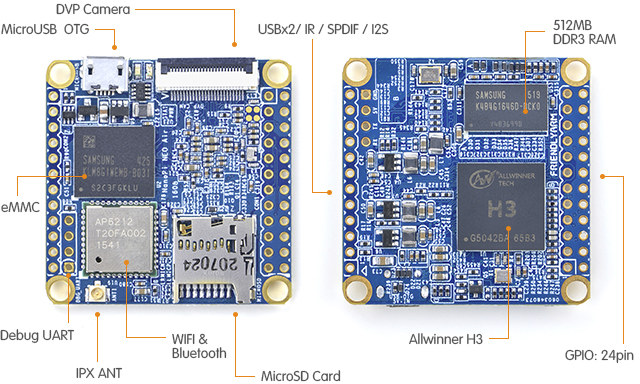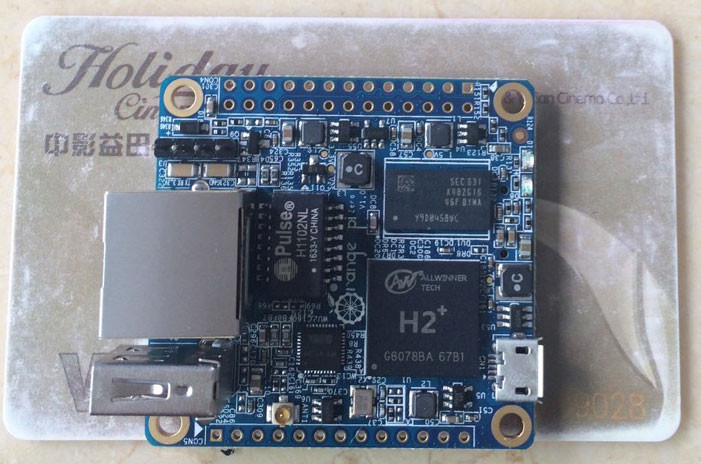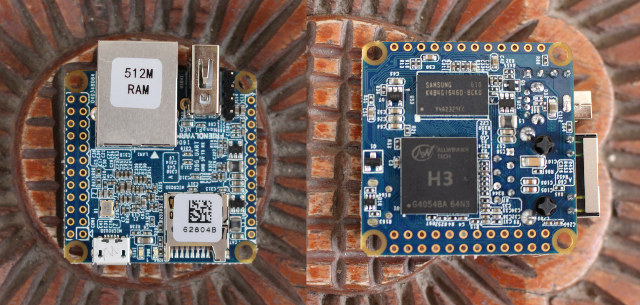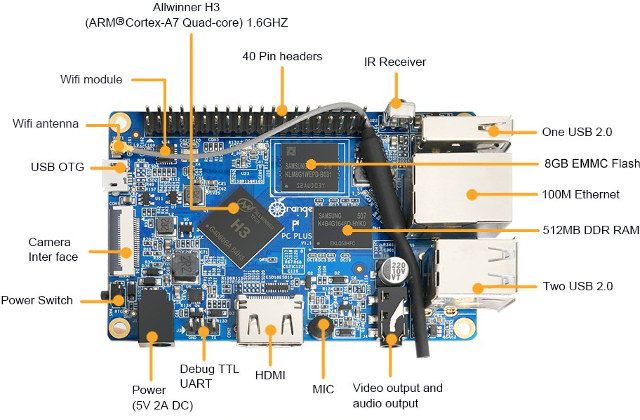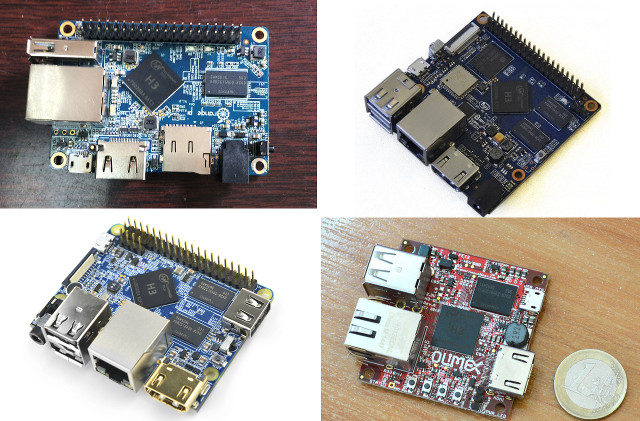2016 has been the year of retrogaming comeback with products like PocketCHIP, Nintendo NES Classic, GPD Win and quite a few other projects. There will soon be a new option with RetroEngine Sigma, an inexpensive Linux based retro-gaming console based on Allwinner H3 processor. RetroEngine Sigma fanless game console hardware specifications: SoC – Allwinner H3 quad core Cortex A7 @ 1.2 GHz with an ARM Mali-400MP2 GPU up to 600 MHz System Memory – 512 MB DDR3 Storage – 16 or 32GB micro SD card Video & Audio Output – HDMI port Connectivity – 802.11 b/g/n WiFi USB – 2x USB 2.0 host ports, 1x micro USB OTG port Misc – Programmable status LED, 2 user configurable buttons P1 & P2 Power Supply – 5V/2A via power barrel Dimensions – 110 x 85 x 33.5 mm The specifications look similar, so I went to my little list of Allwinner H3 […]
Orange Pi PC 2 Development Board based on Allwinner H5 SoC Launched for $20
Shenzhen Xunlong had already launched Orange Pi Zero, the cheapest ARM Linux board with networking you can find today, earlier this week, and I’ve just been informed the company has now listed the more powerful Orange Pi PC 2 board powered by Allwinner H5 quad core Cortex A53 processor on Aliexpress for $19.98 plus shipping.Orange Pi PC 2 specifications: SoC – Allwinner H5 quad core Cortex A53 processor with an ARM Mali-450MP4 GPU System Memory – 1GB DDR3 Storage – micro SD card slot up to 64GB, 8Mbit SPI NOR flash Video Output – HDMI 1.4 with CEC support, AV port Audio I/O – HDMI, AV port, on-board microphone Connectivity – Gigabit Ethernet USB – 3x USB 2.0 host ports, 1x micro USB OTG port Camera – MIPI CSI Interface Expansions – 40-pin Raspberry Pi compatible header Debugging – 3-pin UART header for serial console Misc – IR receiver; Power […]
Orange Pi Zero Allwinner H2+ Board with WiFi and Ethernet is Up for Sale for $7 and Up
Orange Pi Zero development board powered by Allwinner H2+ quad core Cortex A7 processor with 256 to 512MB RAM, Ethernet, and USB ports is now available for sale on Aliexpress for just $6.99, with shipping adding $3.39 in my case bringing the total to $10.38. Orange Pi Zero specifications: SoC – Allwinner H2(+) quad core Cortex A7 processor @ 1.2 GHz with Mali-400MP2 GPU @ 600 MHz System Memory – 256 to 512 MB DDR3-1866 SDRAM Storage – micro SD card slot Connectivity – 10/100M Ethernet + 802.11 b/g/n WiFi (Allwinner XR819 WiFi module) with u.FL antenna connector and external antenna USB – 1x USB 2.0 host ports, 1x micro USB OTG port Expansion headers – Unpopulated 26-pin “Raspberry Pi B+” header + 13-pin header with headphone, 2x USB 2.0, TV out, microphone and IR receiver signals Debugging – Unpopulated 3-pin header for serial console Misc – 2x LEDs Power […]
FriendlyARM Introduces NanoPi NEO AIR Board with WiFi & BLE, Camera Interface and 8GB Storage for $17.99
FriendlyARM launched NanoPi NEO board with Allwinner H3 processor, Ethernet, and USB ports for $7.99 to $9.99 in July, and the company is back with a new board with the same form factor and processor, by trading Ethernet for WiFi, dropping one USB 2.0 port for a DVP camera interface, and adding an 8GB eMMC flash. NanoPi NEO AIR specifications: SoC – Allwinner H3 quad-core Cortex A7 @ 1.2 GHz with an ARM Mali-400MP2 GPU up to 600 MHz System Memory – 512 MB DDR3 Storage – 8GB eMMC Flash (Samsung) + micro SD card slot Connectivity – WiFi 802.11 b/g/n and Bluetooth 4.0 LE (via Ampak AP6212 module) with IPEX antenna connector USB – 1x micro USB OTG port, 2x USB via headers Camera – 1x DVP camera interface with optional 5MP CAM500B camera Expansion headers 24-pin header with I2C, 2x UART, SPI, PWM, and power signals 12-pin header […]
Orange Pi Zero and Orange Pi i96 96Boards IoT Edition Boards Coming Soon
Shenzhen Xunlong Orange Pi boards are relatively popular thanks to their low price, and support on communities such as Armbian, but two new upcoming Orange Pi boards might make the company even more relevant in the development board space. First, the company is nearing completion of the tiny, and hopefully ultra cheap, Orange Pi Zero board with Allwinner H2+ processor, and Linaro has announced that an Orange Pi i96 boards compliant with 96Board IoT specifications is also coming soon. Orange Pi Zero The board has not been released, but some pictures have been uploaded to Armbian forums. Orange Pi Zero looks quite similar to NanoPi NEO board but with different processor, a slightly larger form factor, and both Ethernet and wireless connectivity. We don;t have other information for now, but it still possible to get most of Orange Pi Zero specifications from the photos: SoC – Allwinner H2(+) quad core […]
NanoPi NEO Board Gets Armbian Debian 8 & Ubuntu 16.04 with Linux 4.6 & 4.7 (Mainline), h3consumption Power Consumption Tool
We’ve been blessed with a wide range of low cost Allwinner H3 boards thanks to Shenzhen Xunlong Orange Pi and FriendylARM NanoPi boards. Recently, armbian developers have been focusing on NanoPi NEO board, and they’ve now released Debian Jessie and Ubuntu Xenial with Linux 4.6.7 and Linux 4.7.2. The latter is mainline kernel with some patchsets for Ethernet. You can download the Linux 4.6.7 based “beta” images from armbian NanoPi NEO page, and selected the “Vanilla” versions, then flash then one a micro SD card as you would normally do. Linux 4.7.2 based “experimental” images with USB OTG support and schedutil cpufreq governor can be found on the separate server in a temporary directory. Thomas Kaiser explains further: Ethernet and throttling are working (the latter not as efficient as with legacy kernel but at least it protects the SoC from overheating). Please note that all vanilla kernel images currently suffer from […]
Orange Pi PC Plus Quad Core Development Board with 1GB RAM, 8GB eMMC flash Sells for $20
Most low cost development boards do not include internal storage in order to decrease costs, and instead require their users to flash their preferred operating system on (micro) SD card. This makes it easy to get started, but many micro SD cards often suffer from poor random I/O performance, even for Class 10 or greater card, leading to a poor user experience compared to what you’d get with an eMMC flash. Shenzhen Xunlong has released yet another Allwinner H3 board, namely Orange Pi PC Plus, similar to Orange Pi PC but adding WiFi, and 8GB eMMC flash. Orange Pi PC Plus specifications with main change with Orange Pi PC highlighted in bold: SoC – Allwinner H3 quad core Cortex A7 @ 1.3 GHz with ARM Mali-400MP2 GPU up to 600 MHz System Memory – 1GB DDR3 Storage – 8GB eMMC flash + micro SD card slot Video Output – HDMI […]
Allwinner H3 Boards Comparison Tables with Orange Pi, Banana Pi M2+, NanoPi P1, and H3-OlinuXino-NANO Boards
Allwinner H3 SoC has now found its way into many low cost development boards, including several Orange Pi Boards, Banana Pi M2+, NanoPi M1, and Olimex H3-OlinuXino-NANO, and it might be difficult to choose among the list of boards available, so tkaiser has written a buyer’s guide for boards supported by Armbian, with some of the key differentiating factors, and on my side, I thought it might be a good idea to draw a comparison table between the boards. Since a table with 10 boards would be hard to read, I made two tables: one with boards with 512 MB RAM + Orange Pi PC / PC Plus, and a second table with higher end boards with 1 to 2 GB RAM, and more features. But first let’s talk about Allwinner H3 SoC since it’s common to all boards. It’s a quad core Cortex A7 processor clocked at up to […]


